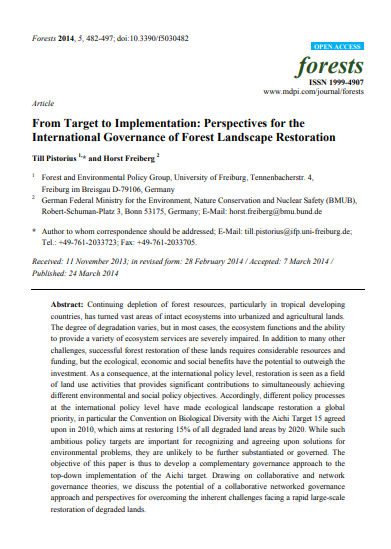Forests (ISSN 1999-4907) is an international and cross-disciplinary scholarly journal of forestry and forest ecology. It publishes research papers, short communications and review papers. There is no restriction on the length of the papers. Our aim is to encourage scientists to publish their experimental and theoretical research in as much detail as possible. Full experimental and/or methodical details must be provided for research articles.
There are, in addition, unique features of this journal:
- computed data or files regarding the full details of the experimental procedure, if unable to be published in a normal way, can be deposited as supplementary material
- we also accept manuscripts communicating to a broader audience with regard to research projects financed with public funds
- manuscripts regarding research proposals and research ideas are welcomed
Members:
Resources
Displaying 211 - 215 of 236Tenure Security and Land Appropriation under Changing Environmental Governance in Lowland Bolivia and Pará
Appropriation of public lands associated with agricultural frontier expansion is a longstanding occurrence in the Amazon that has resulted in a highly skewed land-tenure structure in spite of recent state efforts to recognize tenure rights of indigenous people and smallholders living in or nearby forests. Growing concerns to reduce environmental impacts from agricultural development have motivated state governments to place greater attention on sustainable land management and forest conservation.
Multi-level Governance of Land Use Changes in the Brazilian Amazon: Lessons from Paragominas, State of Pará
Land use governance in the Brazilian Amazon has undergone significant changes in the last decade. At the national level, law enforcement capacity has increased and downstream industries linked to commodity chains responsible for deforestation have begun to monitor some of their suppliers’ impacts on forests. At the municipal level, local actors have launched a Green Municipality initiative, aimed at eliminating deforestation and supporting green supply chains at the territorial level.
From Target to Implementation: Perspectives for the International Governance of Forest Landscape Restoration
Continuing depletion of forest resources, particularly in tropical developing countries, has turned vast areas of intact ecosystems into urbanized and agricultural lands. The degree of degradation varies, but in most cases, the ecosystem functions and the ability to provide a variety of ecosystem services are severely impaired. In addition to many other challenges, successful forest restoration of these lands requires considerable resources and funding, but the ecological, economic and social benefits have the potential to outweigh the investment.
Processes Underlying 50 Years of Local Forest-Cover Change in Yunnan, China
Recognition of the importance of forests for local livelihoods, biodiversity and the climate system has spurred a growing interest in understanding the factors that drive forest-cover change. Forest transitions, the change from net deforestation to net reforestation, may follow different pathways depending on a complex interplay of driving forces. However, most studies on forest transitions focus on the national level rather than the local level.
Multi-Scalar Governance for Restoring the Brazilian Atlantic Forest: A Case Study on Small Landholdings in Protected Areas of Sustainable Development
Implementation of forest restoration projects requires cross-scale and hybrid forms of governance involving the state, the market, civil society, individuals, communities, and other actors. Using a case study from the Atlantic Forest Hotspot, we examine the governance of a large-scale forest restoration project implemented by an international non-governmental organization (NGO) on family farmer landholdings located within protected areas of sustainable development.






